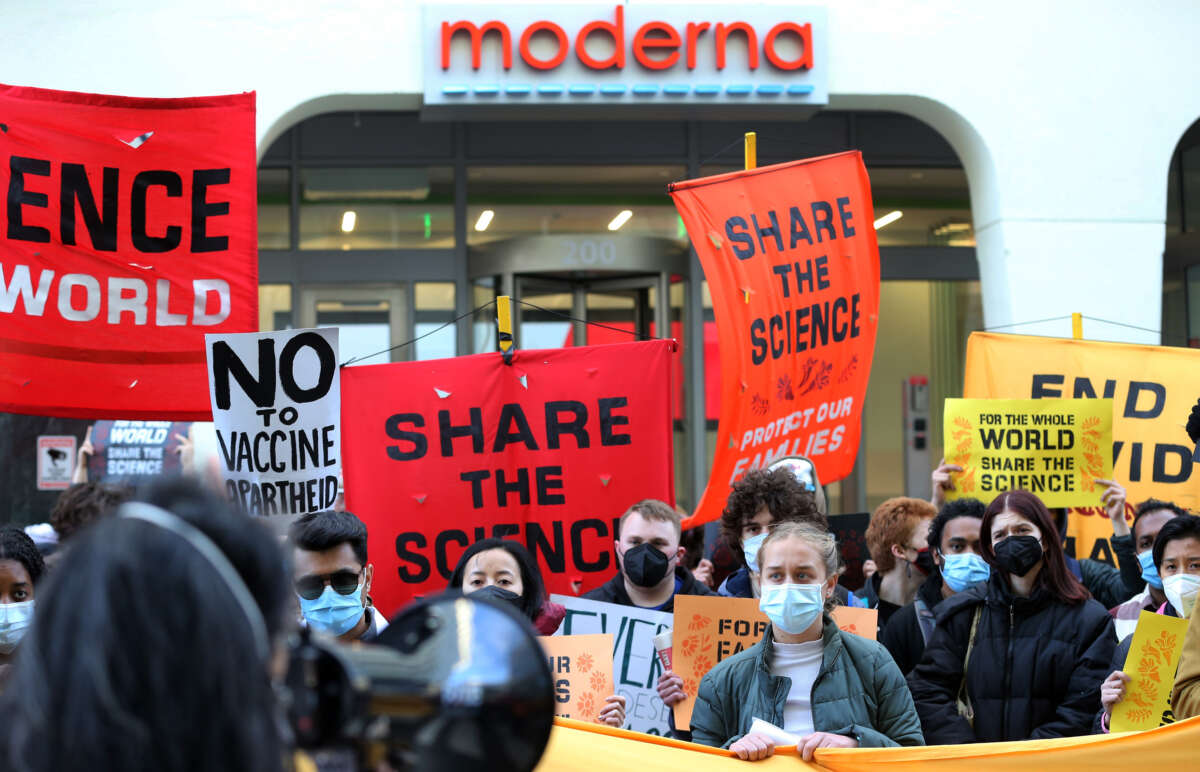Did you know that Truthout is a nonprofit and independently funded by readers like you? If you value what we do, please support our work with a donation.
The Massachusetts-based pharmaceutical giant Moderna faced angry backlash on Tuesday following the CEO’s announcement that the firm is considering pricing its Covid-19 vaccine somewhere between $100 and $130 per dose in the United States.
The upper end of that range, according to the People’s Vaccine Alliance (PVA), would represent a 4,000% markup above the cost of manufacturing the shot, which experts have pegged at roughly $2.85 per dose.
“The sheer greed is obscene,” said PVA policy co-lead Julia Kosgei, who stressed that “billions of taxpayer dollars went into the development of mRNA vaccines.”
“This vaccine isn’t just Moderna’s, it was developed in collaboration with a government agency based on decades of publicly-funded research,” Kosgei said. “It is the people’s vaccine — and it should be available and affordable for everyone, everywhere.”
Stephane Bancel, Moderna’s billionaire CEO, defended the proposed price range in an interview on the sidelines of the J.P. Morgan Healthcare Conference in San Francisco, telling The Wall Street Journal that he believes “this type of pricing is consistent with the value” of the vaccine, which was developed with the crucial help of government scientists.
In 2020, Moderna admitted that 100% of the funding for its vaccine development program came from the federal government — which, despite its leverage, has refused to force the company to share its vaccine recipe with the world.
Moderna’s pricing plans come as the Biden administration is transitioning away from its free coronavirus vaccine program, shifting costs onto insurers and patients — and leaving the uninsured and underinsured with potentially significant bills.
In August, the Health and Human Services Department announced that “as early as January 2023, the administration anticipates no longer having federal funds to purchase or distribute vaccines and will need to transition these activities to the commercial market, similar to seasonal flu or other commercially available vaccines.”
The Washington Post’s Rachel Roubein noted Tuesday that “the federal government has paid far less for the company’s vaccine than the potential price for commercial insurers. Moderna’s updated booster shot cost the Biden administration about $26 per dose last summer, according to federal supply contracts.”
The Kaiser Family Foundation (KFF) warned in a recent policy brief that the commercial price of coronavirus shots “could discourage vaccination.”
“The suggested average price for Covid-19 vaccines after commercialization ($96 to $115 per dose) is significantly higher than the commercial price for the annual flu vaccine ($18 to 28 per dose), and could be a cost barrier for the uninsured and underinsured, who have no guaranteed mechanism for receiving COVID-19 (or any) vaccines once federal supplies are depleted,” KFF observed. “While most consumers with public and private insurance will be protected from having to pay directly for vaccine costs, those who are uninsured and underinsured may face cost barriers when the federally-purchased vaccine doses are depleted. In addition, as private payers take on more of the cost of vaccinations and boosters, this could have a small upward effect on health insurance premiums.”
In a statement, Kosgei argued that “it doesn’t have to be like this.”
“The World Health Organization is supporting a program to share mRNA vaccine technology with producers in low and middle-income countries,” said Kosgei. “In a future pandemic, this could rapidly supply doses for the entire world, but Moderna’s patents are standing in the way. We need to learn from this pandemic and break big pharma’s monopolies.”
Press freedom is under attack
As Trump cracks down on political speech, independent media is increasingly necessary.
Truthout produces reporting you won’t see in the mainstream: journalism from the frontlines of global conflict, interviews with grassroots movement leaders, high-quality legal analysis and more.
Our work is possible thanks to reader support. Help Truthout catalyze change and social justice — make a tax-deductible monthly or one-time donation today.
